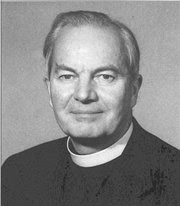What is the gospel, really? T.F. comes correct.
 Look at him: those kind eyes, that gentle Mona-Lisa smirk. T.F. looks like the priest that helps little Timmy and his family in an old 40's movie. But the man laid it d.o.w.n...:
Look at him: those kind eyes, that gentle Mona-Lisa smirk. T.F. looks like the priest that helps little Timmy and his family in an old 40's movie. But the man laid it d.o.w.n...:"...the real text of the New Testament revelation is the humanity of Jesus. As we read the Old testament and read the New Testament and listen for the Word of God, the real text is not the documents of the Pentateuch, the Psalms or the prophets or the documents of the Gospels and the Epistles, but in and through them all the Word of God struggling with rebellious human existence in Israel on the way to becoming incarnate, and then that Word translated into the flesh and blood and mind of a human being in Jesus, in whom we have both the Word of God become man and the perfect response of man to God offered on our behalf, As the real text of God's Word addressed to us, Jesus is also the real text of our address to God. We have no speech or language with which to address God but the but the speech and language of Jesus Christ. In him our humanity, our human understanding, our human words are taken up, purified and sanctified, and addressed to God the Father for us as our very own- and that is the word of man with which God is well pleased." (The Mediation of Christ, p.78, emphasis mine.)
When I read passages such as this, I marvel at them. The theology is breathtaking to me, but there is a way that such theology can remain outside of a lot of my ordinary life. This is not a reflection T.F. Torrance, I should add, as he and Ray Anderson have been some of the most helpful in practical discussions. So what do I take from this passage?
 Very practically, Torrance's point helps me consider how to understand Jesus' teaching in the Gospels. We often read passages like the Sermon on the Mount and conclude that Christ sets out an impossible agenda that breaks us so that grace may enter. But if Christ is the human response to God, those commandments, the Sermon on the Mount, are not anvils to break us, but ways to speak the same language as God, to commune with him. Giving ourselves is in fact how we participate in the conversation between God and humanity that Jesus opens to us.
Very practically, Torrance's point helps me consider how to understand Jesus' teaching in the Gospels. We often read passages like the Sermon on the Mount and conclude that Christ sets out an impossible agenda that breaks us so that grace may enter. But if Christ is the human response to God, those commandments, the Sermon on the Mount, are not anvils to break us, but ways to speak the same language as God, to commune with him. Giving ourselves is in fact how we participate in the conversation between God and humanity that Jesus opens to us.I confess though, that I arrive at the same conclusions regarding the necessity of the Sermon on the Mount through exegetical means, though. So I often wonder, what is an appropriate theological hermeneutic? Or is it incorrect to isolate such a piece of Torrance or any other theologians project and expect to reap practical help? I wish there were more connection between the dramatic theological landscape and the 21st Century urban protestant world I live in. Certainly Torrance's Christology is a rich field to mine. It just takes some work. :)


Yo! Let me know if we're still on for Wednesday for lunch. Looking forward to it!
ReplyDelete